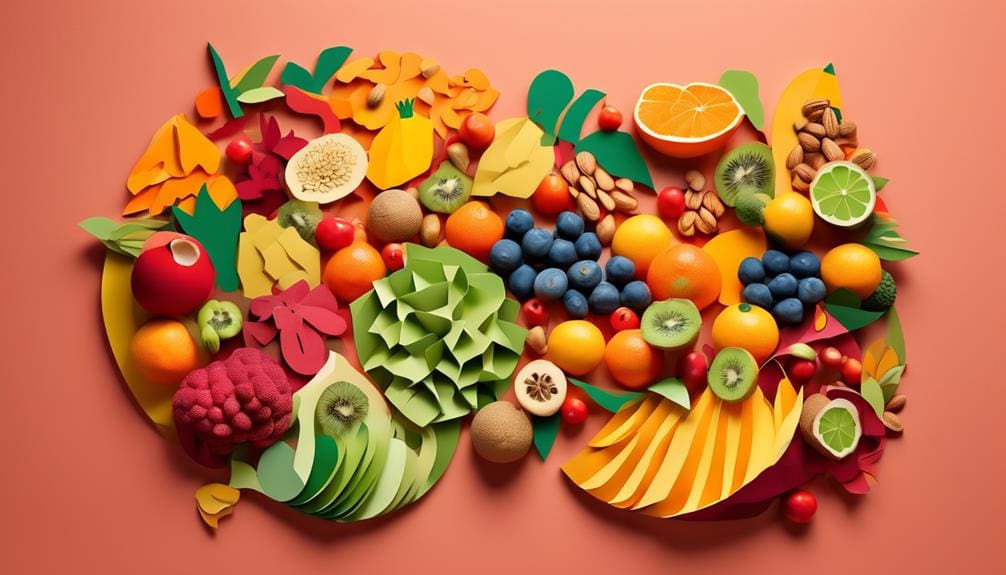Isn't it a coincidence that some of the healthiest foods on the planet are also the most readily available? As a nurse, you're no stranger to the demands of long shifts and the necessity of maintaining a robust immune system. You've likely heard whispers around the break room about the latest superfoods, but let's get to the heart of it: incorporating nutrient-rich options like green tea, almonds, and dark leafy greens into your diet isn't just trendy—it's a game-changer for your health.
These superfoods pack a punch with antioxidants, heart-healthy fats, and immune-boosting properties that can help keep you at the top of your game. Now, imagine having a few more secrets up your sleeve, foods that not only enhance your immunity but also support your overall well-being, making those 12-hour shifts feel a bit more manageable.
Stick around to uncover the full spectrum of superfoods that could transform your approach to health, both in and out of the hospital.
Key Takeaways
- Dark leafy greens like kale and spinach boost the immune system with vitamins and antioxidants.
- Garlic and ginger have medicinal properties that strengthen the body's defense mechanisms.
- Berries, such as strawberries and raspberries, support immune health with their antioxidants.
- Regular consumption of green tea promotes overall health and reduces the risk of chronic diseases.
Essential Dark Leafy Greens
Incorporating essential dark leafy greens like kale and spinach into your diet can significantly boost your immune system with their rich supply of vitamins and antioxidants. These leafy greens aren't just ordinary vegetables; they're powerhouses packed with nutrients essential for maintaining a healthy immune system.
Rich in vitamin C, vitamins A, and K, they offer a natural way to fortify your body's defenses against illnesses.
Leafy greens, with their abundance of immune-supporting nutrients, play a crucial role in your overall health. They're high in antioxidants that help support immune function, making them a must-have in your daily meals.
Beyond their immune benefits, these greens are a good source of iron and calcium, and they contain fiber for a healthy digestion, contributing to your body's ability to fend off diseases.
Power of Garlic and Ginger
Harnessing the power of garlic and ginger can significantly bolster your immune system, offering protection against common colds and promoting better blood circulation. As a nurse, you're always on the frontline, serving others, and it's crucial to keep your immune response strong.
Garlic, known for its medicinal properties, can help fight off influenza and colds, making it a superhero in your pantry. Its health benefits don't stop there; garlic contains antioxidants and bacteria that help combat oxidative stress, reducing your body's vulnerability to illnesses.
On the other hand, ginger, with its potent anti-inflammatory properties, not only aids in soothing sore throats but also improves blood circulation. This dynamic duo can be seamlessly integrated into your daily meals or teas, enhancing not just the flavor but also your body's defense mechanisms.
The Role of Berries
Berries' arsenal of antioxidants makes them a powerhouse for boosting your immune system, offering both delicious flavors and vital nutrients. Rich in vitamins A, C, and E, they're key players in your health defense, supporting the function of your immune system. By incorporating berries into your diet, you're not just satisfying your sweet tooth but also fortifying your body's defenses.
| Berry Type | Health Benefit |
|---|---|
| Blueberries | Reduces inflammation and supports brain health |
| Strawberries | High in vitamin C, boosting immune health |
| Raspberries | Packed with antioxidants, fighting free radicals |
| Blackberries | Rich in nutrients, supports healthy blood cells |
Berries help reduce inflammation, a critical aspect of maintaining overall health. Their antioxidants combat free radicals, protecting your cells from damage. This means you're not just taking care of your immune system but also supporting your brain health and memory.
Incorporating berries into your diet is easy and versatile. Enjoy them fresh, blend them into smoothies, or add them to desserts. Remember, your health is your wealth, especially when you're committed to serving others. Make berries a regular part of your diet to keep your immune system healthy and robust.
Benefits of Green Tea
While you're adding berries to your diet for their immune-boosting benefits, don't overlook the powerful advantages of green tea. As a health care professional dedicated to serving others, including this beverage in your healthy diet can work wonders for your own health. Green tea isn't just a soothing drink; it's a potent ally in maintaining your wellbeing.
Green tea is rich in vitamins, polyphenols, and catechins, which all play a crucial role in enhancing your immune system. By switching from coffee to green tea, you not only embrace a drink low in caffeine but also packed with nutritional benefits that support healthy body functions.
Here's why green tea should be your go-to beverage:
- Rich in vitamins and antioxidants: These help reduce the risk of chronic diseases and support healthy aging, promoting a healthy lifestyle.
- Improves brain function: Regular consumption can help sharpen your focus and regulate mood, essential for those long shifts.
- Prolongs life: Studies suggest that green tea drinkers have a lower risk of premature death, making it a valuable addition to your diet.
Incorporating green tea into your daily routine can help you stay at the top of your game, both for yourself and those you care for.
Nourishing Whole Grains
As a nurse, integrating whole grains into your diet is a powerful step toward boosting your immune health and maintaining energy throughout those demanding shifts. Whole grains aren't just a source of sustenance; they're rich in fiber, vitamins, and minerals that support a healthy immune system. They're your allies in ensuring you have the vitality to care for others.
Quinoa, for instance, is a marvel. It's not only a complete protein, packed with all nine essential amino acids, but it's also gluten-free. This makes it an excellent choice for those with dietary restrictions. Brown rice is another powerhouse, high in fiber and beneficial for heart health, ensuring you stay robust and ready to face any challenge.
Opting for whole grain bread and pasta over refined grains can significantly impact your immune system. These whole grains aren't high in Vitamin C or omega-3 fatty acids directly, but they contribute to a healthy gut, which recent studies suggest is crucial for overall health. A healthy gut aids in the absorption of Vitamin D and zinc supplementation, both vital for immunity.
Frequently Asked Questions
What Superfoods Boost Your Immune System?
To boost your immune system, include yogurt, garlic, citrus fruits, berries, and spinach in your diet. They're packed with vitamins, antioxidants, and probiotics that support your immune function and overall health.
What Is the Best Food to Eat to Boost Your Immune System?
Eating yogurt's like donning an armor against colds, thanks to its probiotics. It's your gut's best friend, boosting your immune defense to superhero levels. So, dive into that creamy goodness and shield up!
What Is the Fastest Immune Booster?
You're seeking the quickest immune booster, and it's Vitamin C-rich fruits like oranges and lemons. They're not only fast at strengthening your immune system but also support healthy skin through collagen production.
What Are the Best Nutrients to Boost the Immune System?
To armor up your immune system, focus on vitamin C, probiotics, antimicrobial agents, antioxidants, and a wealth of vitamins and minerals. These nutrients are your shield, keeping you strong as you care for others.





